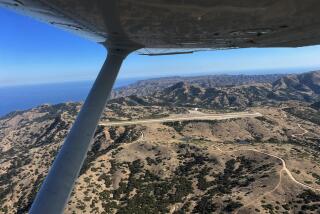Pilot Recalls Safe Conclusion of a ‘Miracle’ Flight
- Share via
TORONTO — Air Transat Flight 236 was more than seven miles above the Atlantic Ocean before dawn Friday when Capt. Robert Piche heard the right engine stop. He started to descend slowly to reduce the strain on the remaining engine. Two minutes later, the second engine failed. A check of the fuel gauges showed that a leak had almost drained the fuel tanks.
Piche had no engines working, 10 minutes of fuel left and a plane full of 304 passengers and crew on their way from Canada to Portugal. He told the crew to prepare to ditch in the ocean.
On Tuesday, Piche and two other crew members calmly recounted at a news conference in Montreal what happened next on the charter flight that has become known as “Miracle Flight 236.”
Their accounts, combined with a report by Portuguese aviation authorities and passengers’ statements, paint a portrait of a crew struggling to safely land the stricken plane.
The flight attendants began to gather up the breakfast trays they had just passed out--the first signal to the just-waking passengers that something was wrong with the Airbus A-330. As they began to demonstrate emergency water landing procedures, a few people screamed. Some went white and blankly calm. Many started to pray.
In the cockpit, though, Piche and his co-pilot, Dirk DeJager, were intently focused, struggling to control the plane as it dropped quickly through the sky. At 6:13 a.m, Piche reached the air control tower at a U.S. Air Force base on the Azores island of Terceira, a dot in the ocean 30 minutes and many miles away. While passengers donned life jackets, Piche steered the powerless craft like a glider toward the island, about 800 miles from Portugal.
For 18 minutes, the plane rode the wind until the island was finally visible. DeJager went on the public address system, telling the crew to prepare passengers for a rough ground landing instead of a splashdown.
Using only basic instruments and instructions from the control tower, Piche guided the jet onto a short airstrip. Exactly 33 minutes after the first emergency call, the plane’s tires touched down. After the craft shuddered to a halt, the crew evacuated all of the passengers in less than 90 seconds. Ten people suffered minor sprains or fractures going down the slides.
But they were alive.
Thirty-three minutes is a long time to know you hold the fate of more than 300 people in your hands. But Piche said Tuesday that he thought of nothing but doing his job right.
“It’s not what pilots like to dream about,” said Piche, who has been flying for 30 of his 49 years and mastered tricky landings as a bush pilot on Quebec’s rugged Anticosti island. He joined Air Transat, Canada’s largest charter airline, five years ago.
“Even though you’re trained, ready, you’re always surprised,” he told reporters. “It makes no sense that a big jet with two engines has no more power with 300 people on board. I guess at that time my experience came in.”
First Officer Meleni Tesic praised the pilots and flight attendants for their professionalism, as well as the passengers for not panicking during the last few minutes of the final approach.
“It was an extremely silent cabin,” she said. “There was not a pin drop to be heard.”
However, passenger Renato Marcelino told Portuguese television Sunday in Lisbon that the last half an hour before the emergency landing was “brutal. It was horrible. It was everything you could imagine.”
After all the fears and prayers, he was amazed that the plane landed safely.
“The pilot was extraordinary,” he said.
“My wife was hysterical. My father-in-law was white,” Daniel Rodrigues, a 24-year-old helicopter pilot trainee from Toronto on the way to Portugal with his family for a wedding, told Canadian Press news service after the landing. He said that one member of the cabin crew was swearing and that they could hear the panic in another flight attendant’s voice as she shouted instructions.
“Once people heard her voice,” he said, “all the old people started praying.”
While the pilots and crew have been widely hailed as heroes, the government agency Transport Canada ordered a special audit of the airline and has banned it from operating the three twin-engine Airbus A-330s in its 24-plane fleet beyond a 60-minute range of an airport until transport authorities can determine that there are no safety problems with the aircraft.
A preliminary report issued Tuesday by Portuguese investigators said a malfunctioning fuel injection pump caused low fuel pressure in both engines of Flight 236.
Friday’s emergency was the second in a week for the air carrier. A flight was evacuated at the airport in Orlando on Aug. 18 after smoke poured into the cabin. The problem was blamed on an overheated air conditioning system.
Parades and a hero’s welcome are planned for Piche in his hometown in Quebec. The thought of those celebrations makes the pilot uncomfortable.
“That’s what we get trained for, that’s what we get paid for, to be successful in a situation like that,” Piche said. “I’m not a hero.”
Times staff writer Farley reported from New York and special correspondent Perron from Toronto.
More to Read
Sign up for Essential California
The most important California stories and recommendations in your inbox every morning.
You may occasionally receive promotional content from the Los Angeles Times.













